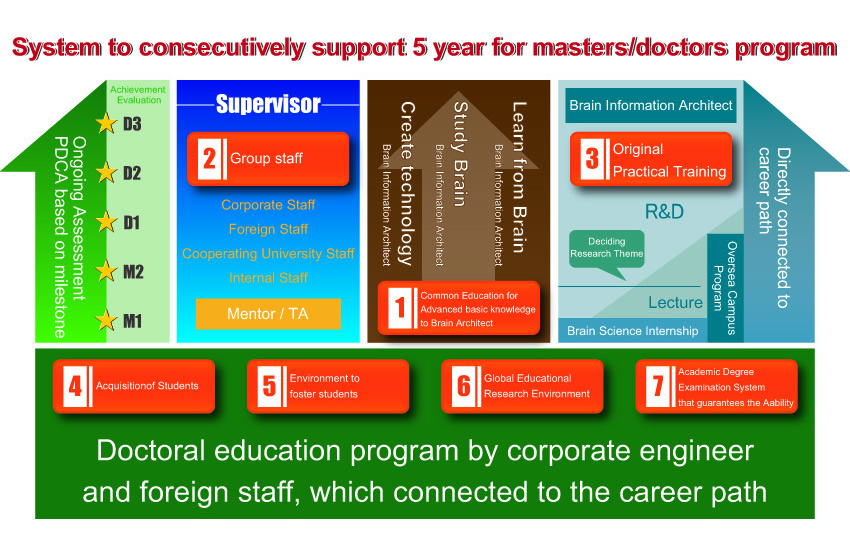Curriculum
Curriculum outline
To train brain information architects, we have implemented an organic educational program that emphasizes collaboration, with the following features:

(1) A research theme is constructed, based on the demands of society and determined by group educators and collaboration with industry, academia and government.
【 Please refer to for more information.】
Group educators from our in-school staff, domestic and foreign universities and research institutions, as well as faculty from corporations, define an interdisciplinary research theme based on large-scale brain information engineering. These definitions also correspond to the various needs and career paths of the students.
The doctoral research theme is decided during the second year of the master’s program. A matching event is conducted with our corporate and research institution partners to determine appropriate research themes. The focus of these efforts is the development of projects that will be important for society. We enhance the capacity to tackle “Problems with no solution” by executing PDCA (Plan, Do, Check, Action).
(2) A systematized interdisciplinary curriculum reinforces global communication skills, life ethics, as well as knowledge and capability in brain science.
【 Please refer to for details.】
We reinforce our Electronics-Inspired Interdisciplinary Education system for advanced interdisciplinary training in five fields: genome function analysis, biosensing, nanophotonics, high-performance simulation, and brain information decoding. The curriculum is systematically organized.
(3) Three stages of external internships are set to develop pragmatic leaders.
【 Please refer to for details.】
During the first and second half of the doctoral program, we strive to develop broad career path options across various fields by having the following three steps of compulsory long-term internships at universities, research institutions, and corporate partners around the globe.
- Brain Science Internship.
- Global Summer School.
- Internship in Doctoral Program.
(4) The six steps towards the academic degree examination
【 Please refer to for details.】
A degree of “Doctor of Engineering” as a “Brain Information Architect” is conferred through the following six stages of academic degree examination:
- Preliminary qualifying examination advancing a second-half doctoral program
- Qualifying examination advancing a second-half doctoral program
- Qualifying examination for Internship in Doctoral Program of a second-half doctoral program
- Qualifying examination on research progress
- Preliminary defense
- Final defense
The academic degree examinations are conducted including the group educators whose primary focus is on research achievement, an international perspective and innovation skills.